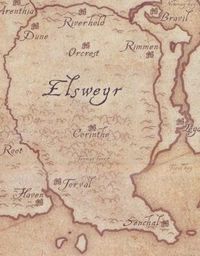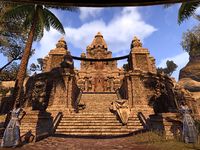Lore:Elsweyr Confederacy
The Elsweyr Confederacy was formed when the warring Khajiiti kingdoms of Anequina and Pellitine merged in 2E 309. Aware of the political impact, Keirgo of Anequina and Eshita of Pellitine married and combined the two kingdoms into the nation of Elsweyr. The formation of the new kingdom did not bring the expected peace. The cleft between tribal culture of the north and nobility of the south was still present. The power between the two former kingdoms, each with their own central government and allied tribes, shifted to the nobility. The chieftains of the north felt betrayed by both their ruling classes and forgot about their vendettas only to sign treaties of their own. Soon the cities of former Anequina were under constant attack, leaving King Keirgo no choice than to petition to the Second Empire for aid. The Empire itself was in similar unrest after their own ruler, Potentate Versidue-Shaie, was assassinated in his palace in Senchal in 2E 324.[1] As Ne Quin-al, the old capital, fell to the rebels, the young confederation seemed ready to break apart.[2][3]
As the rebellion continued, Mane Rid-Thar-ri'Datta, the nonpartisan spiritual leader of the Khajiit, revealed the Riddle'Thar Epiphany in the Temple of Two-Moons Dance of Rawl'kha in 2E 311.[4] The Mane used Riddle'Thar to proclaim a new system of dividing the powers in Elsweyr. Bound to the dance of the two moons—their different phases—the power in a region shifted between the nobility of the cities and the chieftains of the deserts. The Mane itself was overseeing this shift of powers, and as this system was implemented it finally brought peace to Elsweyr some time around or after 2E 324—lasting under many more Manes.[3][2] The edicts from this key event in Khajiiti theology however were not accepted by everyone at this time[5], leading to those exiled and their temples deconsecrated.[6]
Two hundred years later during the chaos of the Interregnum, the Knahaten Flu ravaged the land of the Khajiit. As the Khajiit were focused on fighting against their own extinction, they saw aggression from the Camoran Dynasty and Colovia.[7] Colovian armies, during the reign of the Longhouse Emperors, invaded northern Elsweyr and annexed it. Their invasion went as far as Riverhold and Orcrest, until they were pushed out around 2E 562.[8] This didn't stop the Colovians, and in 2E 576, Euraxia Tharn became Queen of Rimmen after staging the Frostfall Coup.[9] The occupation was short-lived after Euraxia was killed and Rimmen was brought back under the control of the Khajiit in 2E 582, although the Elsweyr Confederacy was left in shambles.[10]
Knahaten Flu continued to spread across Elsweyr until aid came unexpectedly from the Queen Ayrenn and the Kingdom of Alinor, bringing direly needed physicians, healers, and supplies. This aid gradually defeated the Knahaten Flu and saved the Khajiit. In return for, Queen Ayrenn asked the Khajiit to stand by her side as invading armies moved towards southwest Tamriel, to which the Elsweyr Confederacy agreed.[11] The signing of the Elden Accord by Queen Ayrenn, Lord Gharesh-ri and King Aeradan Camoran formed the First Aldmeri Dominion in 2E 580.[12][11] Under the united banner of the Dominion, they entered the Three Banners War[13][14] The Elsweyr Confederacy contended with numerous other threats during the Three Banners War. Colovians once again invaded northern Elsweyr under Javad Tharn and worked together with the Stonefire Cult to corrupt the current Mane Akkhuz-ri and anoint his own Dark Mane, thus corrupting the spiritual soul of the Khajiit.[15][16][17] The conflict came to a head in the city of Dune, where Javed launched an attack by opening Daedric portals and allowing Daedra into the streets. The Khajiit fought back and his plan failed, ending the Daedric threat.[18]
In an effort to stop the Three Banners War, Abnur Tharn inadvertently unleashed the Dragons Kaalgrontiid, Laatvulon and their minions from their containment from the Halls of Colossus. Kaalgrontiid continued pursuing the Prophecy of the New Moon that would see him become the Dark Aeon and ascending to godhood. A Khajiiti dragon cult, known as the New Moon Cult appeared around this time to aid Kaalgrontiid's schemes. Queen Khamira and the recently reformed Dragonguard forged an alliance with the red dragon Nahfahlaar. Through their combined effort, the eventually went on to defeat Laatvulon and later Kaalgrontiid.[19][20][21]
Although Rimmen briefly seceded from the Elswey Confederacy in 2E 812, the ascending Tiber Septim began conquering parts of Anequina during the Tiber War.[3] In the Halls of Colossus, Tiber Septim reconstructed and reactivated the Numidium.[UOL 1] Not long after, Senchal was besieged by Imperial troops under General Pottreid. The population did not surrender and was slain entirely.[22] Ultimately, Elsweyr was annexed to become a province of Tiber Septim's Third Empire.[2]
While Elsweyr thrived under the Empire for most of the Third Era, in 4E 10 the Stormcrown Interregnum began - only ten years after the Oblivion Crisis.[23] Elsweyr once again found itself independent of the Empire, but was granted no peace. In or around 4E 48 the Mane was assassinated, sinking the south of Elsweyr into chaos. During this time, an unknown figure proclaimed himself Potentate of Rimmen and surrounding areas.[24]:179 In 4E 98, Masser and Secunda vanished from the sky for two entire years. The so-called Void Nights ended in 4E 100 with the return of the moons, while the Thalmor took credit for bringing them back. Whether or not they were actually responsible for this turnaround remains unresolved. Nevertheless, as the Khajiit people and culture are tied inexorably close to the moons, the Thalmor were able to win great influence over them as their apparent saviors. Within the following fifteen years, until 4E 115, the influence of the Empire dwindled so much it was unable to stop the coup which dissolved the Elsweyr Confederacy and recreated the original kingdoms of Anequina and Pellitine as client states of the Third Aldmeri Dominion.[25]
References[edit]
- ^ The Brothers of Darkness — Pellarne Assi
- ^ a b c Pocket Guide to the Empire, 3rd Edition: Sugar and Blood: the Cats of the South — Imperial Geographical Society, 3E 432
- ^ a b c Pocket Guide to the Empire, 1st Edition: The Elsweyr Confederacy — Imperial Geographical Society, 2E 864
- ^ ESO Loading Screens: Rawl'kha Temple
- ^ Shazah's dialogue in ESO
- ^ ESO Loading Screens: Claw's Strike
- ^ Pocket Guide to the Empire, 3rd Edition: The Wilds Remain: Valenwood — Imperial Geographical Society, 3E 432
- ^ Khali's dialogue in ESO
- ^ House Tharn of Nibenay — Count Opius Voteporix
- ^ Khamira's dialogue in ESO: Elsweyr
- ^ a b The Eagle and the Cat — Lord Gharesh-ri, Speaker for the Mane
- ^ Lord Gharesh-ri's dialogue in ESO
- ^ The Chorrol Crier
- ^ Welcome to New Aldmeri Irregulars — Aicantar of Shimmerene, Sapiarch of Indoctrination
- ^ Queen Ayrenn's dialogue in ESO
- ^ Javad Tharn's dialogue in ESO
- ^ Bodring's dialogue in ESO
- ^ The Fires of Dune quest in ESO
- ^ Events of Jode's Core in ESO: Elsweyr
- ^ Nahfahlaar's dialogue in ESO: Dragonhold
- ^ Events of New Moon Rising in ESO: Dragonhold
- ^ Attrebus' biography on Redguard's official website
- ^ Rising Threat, Vol. IV — Lathenil of Sunhold
- ^ The Infernal City — Greg Keyes
- ^ The Great War — Legate Justianus Quintius
Note: The following references are considered to be unofficial sources. They are included to round off this article and may not be authoritative or conclusive.
|
|||||

